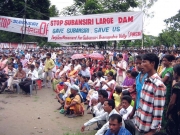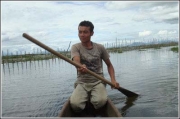Manipur
Big dams create big conflict
Posted on 24 Feb, 2014 04:25 PMNortheast India has been in turmoil over the last two decades or so because of unbridled hydropower development in the region. This article is an effort to understand the extent of hydropower development in the region, the multi-faceted and multi layered conflicts unleashed by this development and also explore ways of engaging with them. It is organised around three broad sections:

Gujarat government arrests activists protesting Narmada weir
Posted on 05 Nov, 2013 11:02 AMGujarat government culls protest against weir on the Narmada river

Forest panel rejects highly opposed dam projects in the Northeast
Posted on 28 Jul, 2013 04:22 PMForest Advisory Committee rejects the controversial Tipaimukh and Dibang hydro-electric projects

Damming North East India - Juggernaut of hydropower projects threatens social and environmental security of region
Posted on 28 Dec, 2010 07:49 PM This report by Kalpavriksh, Aaranyak and ActionAid India deals with the large dams’ juggernaut, which happens to be the biggest ‘development’ intervention in this ecologically and geologically fragile, seismically active and culturally sensitive region in the coming days. With the Northeast identified as India’s ‘future powerhouse’ and at least 168 large hydroelectric projects set to majorly alter the riverscape, large dams are emerging as a major issue of conflict in the region.
This report by Kalpavriksh, Aaranyak and ActionAid India deals with the large dams’ juggernaut, which happens to be the biggest ‘development’ intervention in this ecologically and geologically fragile, seismically active and culturally sensitive region in the coming days. With the Northeast identified as India’s ‘future powerhouse’ and at least 168 large hydroelectric projects set to majorly alter the riverscape, large dams are emerging as a major issue of conflict in the region.
Although the current scale of dam-related developments far outstrips anything which took place in the past, the region has been no stranger to dam-related conflicts. For example, the Kaptai dam, built in the Chittagong Hill Tracts of East Pakistan (now Bangladesh) in the 1960s, submerged the traditional homelands of the Hajong and Chakma indigenous communities, and forced them to migrate into parts of Northeast India.
Ecological destruction of Loktak, the largest freshwater lake in North East India – A five-part FES-InfoChange series
Posted on 13 Nov, 2010 07:18 PM This series by Thingnam Anjulika Samom deals with the impact of modernisation, development and state policy on the traditional use, control and management of Loktak lake, the largest common property aquatic resource in Manipur. The Loktak Hydropower Project commissioned in 1983 has damaged the ecology of the largest freshwater lake in the northeast, and has altered the culture, agricultural and livelihood patterns of communities residing around Loktak. The series looks at what this common property resource used to be and what it has become.
This series by Thingnam Anjulika Samom deals with the impact of modernisation, development and state policy on the traditional use, control and management of Loktak lake, the largest common property aquatic resource in Manipur. The Loktak Hydropower Project commissioned in 1983 has damaged the ecology of the largest freshwater lake in the northeast, and has altered the culture, agricultural and livelihood patterns of communities residing around Loktak. The series looks at what this common property resource used to be and what it has become.
Loktak, the 300-square-km lake is spread over three districts in the valley – Imphal West, Bisnupur and Thoubal and covers 61% of the total identified wetlands of Manipur. Besides being the source of livelihood for hundreds of people, Loktak also houses the floating national park Keibul Lamjao, the only home in the world to the endangered Sangai deer. It is not only the geographical topography of the lake that has changed in the last few decades. The lake is also beset by increasing pollution, siltation, rapid proliferation of phumdis and the commissioning of the Loktak hydel project in the 1980s Manipur or Imphal River, with the Loktak lake forming the headwaters to provide regulated storage for power generation.